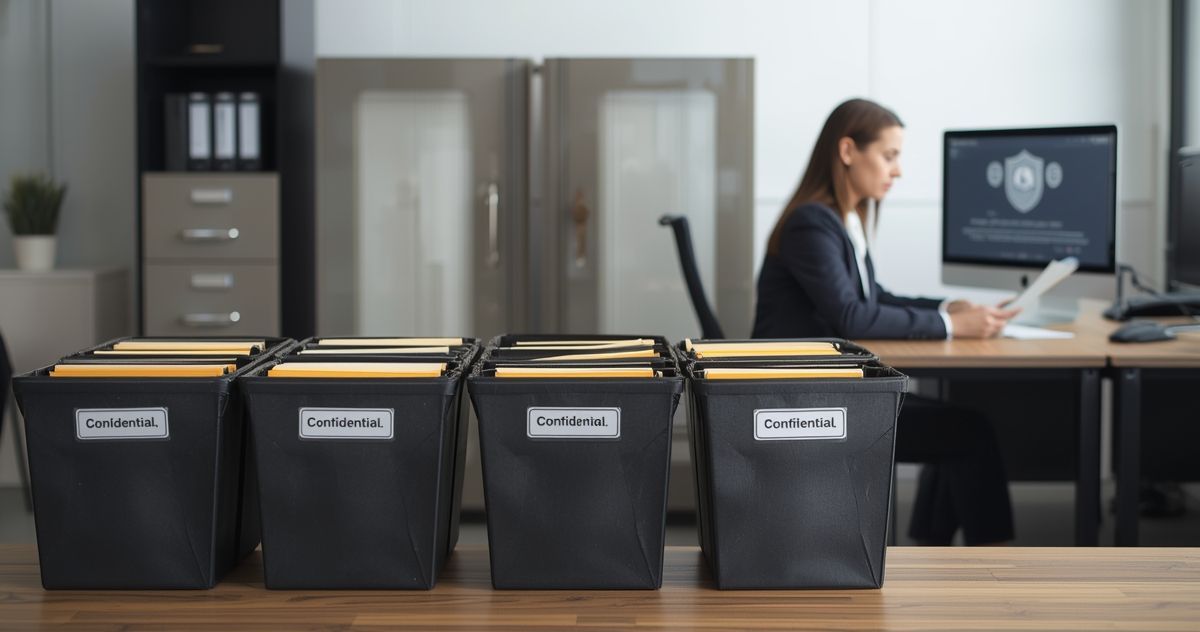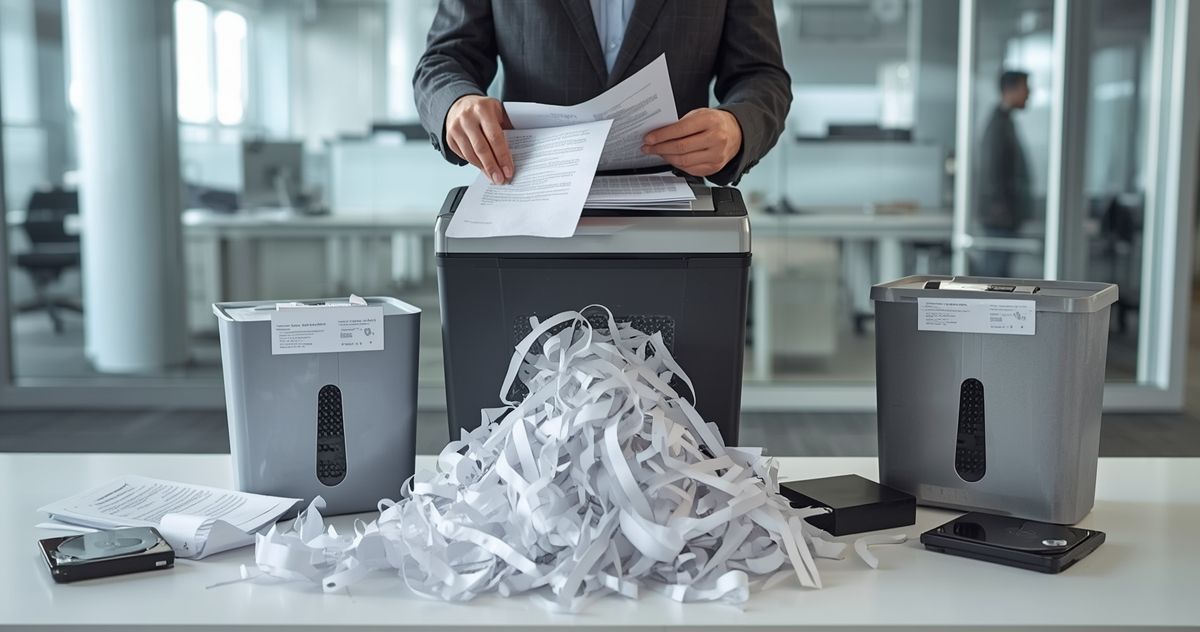Secure Destruction Strategies for Law Firms Handling eDiscovery
Secure Destruction Strategies for Law Firms Handling eDiscovery
Managing sensitive information goes beyond ensuring compliance; it’s about protecting your clients and preserving your firm’s reputation. For law firms handling eDiscovery, where vast quantities of confidential data are involved, secure destruction strategies are paramount. Neglecting this critical process exposes your firm to data breaches, lawsuits, and significant reputational damage.
This guide will explore the best secure destruction strategies tailored for legal professionals, covering techniques for both physical and digital data. By the end, you’ll have actionable steps to safeguard your eDiscovery process and ensure peace of mind.
Why Secure Destruction Matters in eDiscovery
Protecting Confidential Information
The legal industry is built on trust. Clients depend on their law firms to handle their sensitive data with the utmost care. Whether it’s financial records, intellectual property, or personal health information, one misstep can lead to catastrophic consequences.
Compliance with Regulations
Data privacy laws such as GDPR, HIPAA, and the newer state-specific privacy laws in the U.S. require strict adherence to data handling and destruction protocols. Failing to comply can result in heavy fines and legal complications.
Mitigating Risks
Law firms are a prime target for cyberattacks. Improperly disposed hard drives or documents are goldmines for hackers. Secure destruction minimizes these risks, ensuring that sensitive information doesn’t fall into the wrong hands.
Effective Secure Destruction Strategies
1. Understand Your Data
Before devising any destruction strategy, fully understand the types of data your firm handles during the eDiscovery process. These could include:
- Documents and spreadsheets
- Emails and communication logs
- Audio and video files
Categorize the data based on sensitivity and risk levels, and prioritize their secure destruction accordingly.
2. Leverage Professional Paper Shredding Services
Although digital files dominate eDiscovery today, the legal world still relies heavily on printed documents. Contracts, case briefs, and court filings often exist in hard copy. Professional paper shredding services ensure every physical document is irreversibly destroyed.
Partner with NAID-certified services, like DataShredder Corporation, which adhere to strict industry standards.
3. Secure Hard Drive Destruction
For digital data, simply deleting files or formatting hard drives is not sufficient. Files can often be restored with recovery software. Law firms must physically destroy hard drives and other media used in eDiscovery to prevent unauthorized access.
Partnering with a company like DataShredder Corporation can streamline this process. They provide options for shredding not just hard drives, but also mobile devices, USBs, and backup tapes.
4. E-Waste Recycling with Certification
Many law firms upgrade their IT equipment periodically, which means plenty of old devices holding sensitive client information. Certified e-waste recycling companies ensure these devices are destroyed in an environmentally friendly way while maintaining data security. Services like DataShredder’s IT Equipment Recycling include proper certification to confirm compliance.
5. Implement a Document Retention and Destruction Policy
Your law firm should have a clear policy outlining:
- How long documents should be retained before destruction?
- Different levels of security required for various data types.
- Steps for documenting the destruction process.
Having a policy ensures your team follows standardized procedures, leaving no room for ambiguity.
6. Use Digital Tools for Data Oversight
Technology plays a significant role in helping lawyers handle eDiscovery materials. However, don’t overlook tools that help track and safely delete files within your firm’s software applications. Implement solutions with secure digital erasure capabilities to complement physical destruction processes.
7. Chain-of-Custody Documentation
For all forms of secure data destruction, it’s critical to maintain chain-of-custody records. Service providers like DataShredder offer destruction certificates that validate the secure handling and destruction of your data. These records are not just good practice; they’re essential for compliance audits.
8. Train Your Team
Your secure destruction strategy is only as strong as your team’s knowledge and adherence to it. Regularly train your team to recognize risks, understand the consequences of breaches, and follow proper destruction protocols. Provide guidance on working with third-party providers and ensure all employees are familiar with the firm’s data handling policies.
Choosing the Right Vendor for Secure Destruction
Selecting a reputable service provider can be a game-changer in your firm’s secure destruction efforts. When evaluating vendors, prioritize these attributes:
- Certifications: Ensure the company you choose is certified by recognized organizations such as NAID (National Association for Information Destruction) or ISO (International Organization for Standardization). These certifications guarantee that the vendor follows strict guidelines for secure data handling and destruction.
- Transparency: A reliable vendor should offer complete transparency in their processes. Look for companies that provide detailed documentation, such as destruction certificates, which confirm that your data has been securely and irreversibly destroyed. Clear communication and openness are key indicators of a trustworthy service.
- Customer Testimonials: Take the time to read reviews, testimonials, and case studies about the company. Positive feedback can give you confidence in their services. For instance, DataShredder is praised by clients for its efficiency, fast turnaround times, and competitive pricing, making it a great option for those seeking reliable and cost-effective solutions.
Law Firms and the Future of Secure Destruction
The need for secure destruction is not going away. If anything, the increasing digitalization of data and evolving privacy regulations mean that law firms must stay vigilant.
Technological tools can help with oversight, but the final step of destruction still relies heavily on human decision and third-party expertise. Combining best practices with professional services will future-proof your firm’s approach to data security.
Take the First Step Toward Secure Data Disposal
Your firm is entrusted with managing the most sensitive information on behalf of your clients. Certified hard drive destruction is a non-negotiable aspect of ethical legal practice and compliance.
When you’re ready to protect your firm and your clients, reach out to trusted providers. They offer tailored solutions for secure document and device destruction, helping law firms handle eDiscovery with the utmost precision and care.
Don’t wait until risks turn into reality. Safeguard your reputation with our
responsible recycling services. Take the first step today—reach out to DataShredder Corporation and make a difference.











Share On: